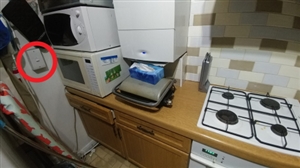
cfcman:
I have an electric shower installed on a 40A RCD, in a room adjacent to my kitchen. The shower is only used in an emergency - i.e. when our gas boiler is unable to provide hot water to our main bathroom. I would like to take a spur from this 40A connection to use for a new double oven, which is rated at 32A. Can anyone advise on a safe and legal way to do this, ensuring that only one of the two appliances can be connected at any one time?

perspicacious:
The simple issue was an existing circuit. A shower circuit. It had already been installed, presumably fit for purpose. The Ib was assessed when it was installed diversity applied, that formed the type/rating of OCPD and the cable. So In>=Ib.
What diversity can you apply to a shower?
Regards
BOD

weirdbeard:
cfcman:
I have an electric shower installed on a 40A RCD, in a room adjacent to my kitchen. The shower is only used in an emergency - i.e. when our gas boiler is unable to provide hot water to our main bathroom. I would like to take a spur from this 40A connection to use for a new double oven, which is rated at 32A. Can anyone advise on a safe and legal way to do this, ensuring that only one of the two appliances can be connected at any one time?hi cfcman out of interest, have you posted this query in any other forums or is this your first port of call? Any pictures you could provide might be really helpful in helping you with your query :)

perspicacious:
The simple issue was an existing circuit. A shower circuit. It had already been installed, presumably fit for purpose. The Ib was assessed when it was installed diversity applied, that formed the type/rating of OCPD and the cable. So In>=Ib.
What diversity can you apply to a shower?
Regards
BOD
Farmboy:
And electrical work is not a profession - thereby making us professionals. We are a trade, that may try to carry out work in a professional way but that does not make us professionals in the sense of Dr's, lawyers, architects, engineers, etc, so no grandisement of the trade please.
We're about to take you to the IET registration website. Don't worry though, you'll be sent straight back to the community after completing the registration.
Continue to the IET registration site